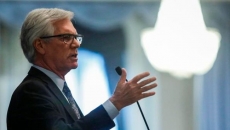Canada has joined the United States, United Kingdom and 21 other countries in a historic deal to stop new direct public finance for coal, oil and gas development by the end of 2022 and shift investment to renewable energy.
"Canada can lead in the low-carbon world if we keep putting our investments, innovations and brain power behind ambitious climate action," Environment Minister Steven Guilbeault said in a news release.
"That means quickly winding down new public international investments in unabated fossil fuels and powering up the shift to clean sources of energy."
But climate activists warn that details still to be worked out give governments some leeway to commit taxpayer resources to fossil fuel projects.
"There's a broad political statement and there's a way to do it in good faith and a way to do it in bad faith," said Bronwen Tucker of Oil Change International, which monitors public investment in oil and gas.
Few details were immediately available about the deal, signed at the COP26 United Nations-sponsored climate meeting in Glasgow, Scotland.
Tucker said it covers all types of public support, including loans, loan guarantees, grants, share purchases and insurance coverage provided to fossil fuel producers by governments, government agencies and government-owned multinational development banks. Her group has calculated that globally the new deal could shift up to $22 billion in investment from fossil fuels to renewable energy.
A recent report from the group said such finance from G20 countries currently averages about $78 billion a year.
What the new agreement means for the $13.6 billion in public finance that Canada provides — the most in the G20 — is less clear.
Most of Canada's oil and gas support comes from Export Development Canada, a Crown agency that helps Canadian businesses sell their products abroad. But the agency operates both domestically and internationally, and determining which funding programs operate where is ambiguous.
Oil Change has calculated that amount could be anywhere from $2 billion to $9 billion. Natural Resources Minister Jonathan Wilkinson has said the figure is closer to $1 billion.
The government said it has yet to define the scope of the new policy.
The deal does allow continued finance of fossil fuels in limited circumstances that are consistent with international climate goals. It also only applies to "unabated" developments, meaning projects that include some kind of mitigation such as carbon capture and storage may still be eligible for support.
Everything depends on how fossil fuel investment is defined, Tucker said.
"I do have some concerns there."
As well, the agreement doesn't include China, Japan or Korea — the world's other top fossil fuel funders.
But Tucker said the deal is a big win for climate policy that will pressure non-signatory governments and private lenders to follow along. She said public finance for coal projects, which has almost completely dried up around the world, is a hopeful example.
"It is a really big deal. It is the first international political commitment that has touched oil and gas finance."
The COP26 deal adds to previous government commitments.
During the recent election campaign, the Liberals said they would eliminate fossil fuel subsidies by 2023. Export Development Canada has said by 2023, it will reduce support to the six most carbon-intensive sectors by 40 per cent below 2018 levels and set "sustainable finance targets'' by July 2022.






